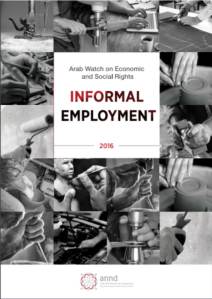Arab Watch on Economic and Social Rights: Informal Employment
The Challenge
The self-immolation of Tarek el-Tayeb Mohamed Bouazizi, a Tunisian street vendor, ignited the series of popular uprisings known as the Arab Spring. Bouazizi was part of the informal economy. Like many others working in the sector, he was poor, self-employed and uninsured, and vulnerable to harassment by local authorities. Though informal labor makes up a significant portion of the work forces in Arab countries across the Middle East and North Africa, and accounts for a large share of their GDP, individuals in the informal economy lack social protections and the rights afforded formal workers, who are more easily organized into unions. Bouazizi’s suicide illustrated how the struggles of informal laborers are central to economic and social development issues in the Arab world— and how these issues, if left unaddressed, can lead to social unrest and political instability.
What’s in the Report
This 2016 report was prepared by a research team composed of members and partners of the Arab NGO Network for Development with the support of the Ford Foundation, Diakonia, Swedish Development Cooperation, Norwegian People’s Aid, and IM Sweden. It addresses three overarching topics: the informal employment situation in thirteen Arab countries, efforts to secure social and economic rights for these workers, and states’ roles in these efforts. Given the problematic trends across the region, it calls for a holistic, rights-based approach to protect vulnerable workers and comply with international labor standards.
The report emphasizes that rates of informal labor are severely underrepresented and underreported. When defined as “employment without social coverage,” informal labor constitutes 50 to 85 percent of total employment in most Arab countries. The report challenges the historical assumption that the informal labor sector would shrink with a country’s overall economic growth and suggests that economic deregulation, coupled with trends related to trade and technology, has actually reduced growth and opportunities in the formal sector. At the same time, rates of informal labor are increasing due to neo-liberal economic policies, a “youth wave,” immigration to Arab countries, and migration into cities— leaving urban areas with an influx of young people seeking work.
“If the powerless are allowed to advocate on their own behalf, and if the powerful listen to their demands, the outcome could be peaceful negotiations, rather than protests, violence and conflict.”
The report offers recommendations for how civil society organizations (CSOs), unions, and governments in Arab countries can address the issue of informal labor from a rights-based perspective. It suggests that CSOs and unions work to increase awareness of and reliable data about the prevalence and challenges of informal labor, and pressure governments to do the same. It also recommends that CSOs and unions promote informal workers’ access to social security, encourage the unionization of informal labor groups, including women and migrant workers, and advocate for the rights of waged informal workers. It calls on governments to address informal workers’ rights in their policies to combat poverty, stimulate entrepreneurship and urban development, and in workplace regulations. Lastly, the report highlights the need for further research, across countries, on expansion of health and social coverage, the effects of poverty reduction strategies on informal labor, and how these link to sustainable urban development.
